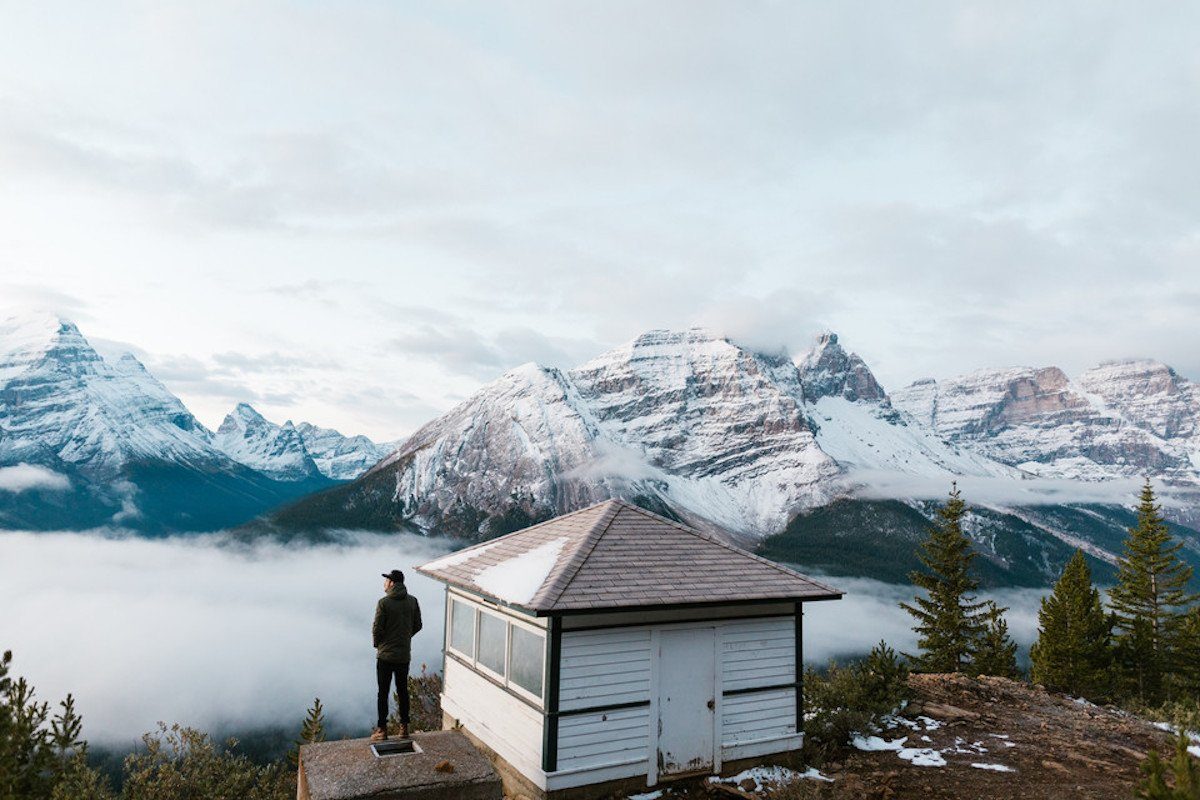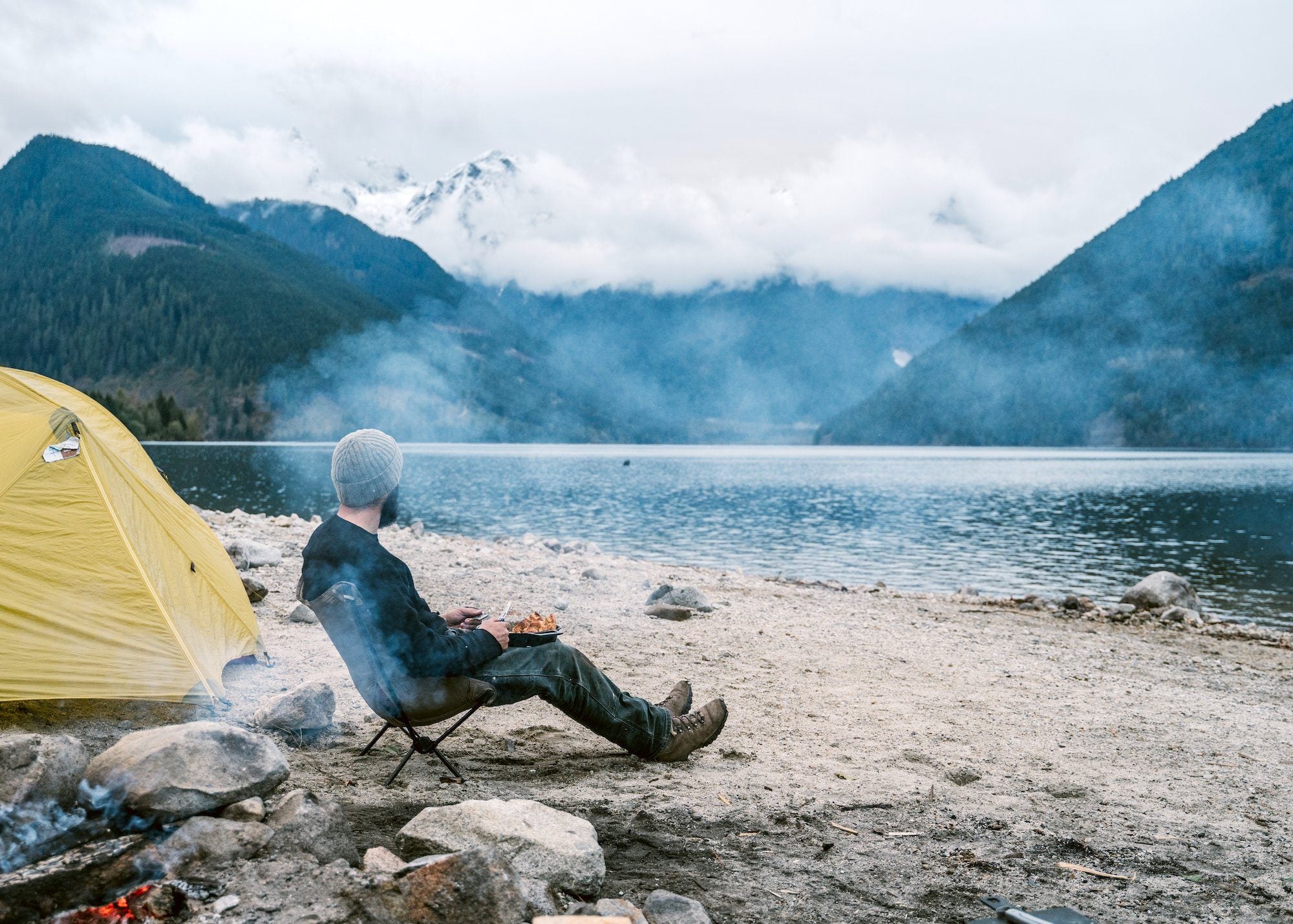In our second and third episodes of Food Tastes Better Outside we’ve partnered up with David Furlonger. An executive chef and avid forager based out of Victoria. With his own coastal-inspired establishment, Breakwater Cafe and Bistro in James Bay. Adding to our series celebrating our local foodie landscape. And hyperlocal chefs inspired by nature, cooking up an exclusive dish in nature. David’s evident joy of interacting with our biodiverse ecosystem, and self-sustaining from it, was one he had to document.
Heading out along the coast of Vancouver Island, David cooks up two fresh meals from kelp, gorse, oyster mushrooms and more. Wearing our durable Hiking Pant, thermo-regulating Work Henley in Cream, and classic 5-panel Sitka Camp Cap. When the evening turned cooler for filming episode two, he added in our wool-insulated quilted cotton Puffy Vest and swapped the Camp Cap for a cozy Fisherman Toque. Discover David’s story, important notes on foraging, and two recipes to try for yourself!

Nature’s Playground
Growing up in Canmore in the Albertan Rockies, the majority of David’s childhood was spent outside. Years spent remote from the busyness of the town in a small cluster of houses in a valley up near Spray Lakes. Privy to his very own natural playground of forests, mountains and trails. And free to roam and discover the fauna and flora abundant in his own backyard.
It’s something his mother credits to his love, and knowledge, of foraging. Sharing that in her mind he taught himself. His first taste of eating wild foods at the ripe age of just three or four, eating Tiger Lily (Mountain Lily) petals. A deep rooted intuition for what he could and couldn’t eat as he headed out into the forests around Canmore as a child. Coming home for lunch without an appetite.
An intuition she also linked to potential heritage — claiming a connection between David and the late botanist David Douglas (his first two names). The same David Douglas who was the first European to discover the Douglas-fir (similar to the Furlonger surname) in Canada. Yet David gives credit instead to a young woman who stayed with them for many years. And in turn taught him about the alpine shrubs and flowers.

Foraging Wild Foods
David’s enjoyment of food led him to his first kitchen job at the age of 14. At a place called The Drake in Canmore. But it wasn’t until he moved to Victoria in 2007 that he really took the opportunity to connect his two passions of commercial kitchen with wild foods. Immersing himself in the island’s surf culture his natural affinity for foraging also gave him a curiosity towards aquatic plants. One that has stuck with him over the years; he’s still keenly interested in using kelp.
The importance of time spent outside is one that is ingrained in David’s wellbeing and lifestyle. “My love for the outdoors comes first. It's very calming to me to be out of the city, away from the material trappings, noises and large groups of people. It's peaceful to get away from it all, the less cell service the better.” Something we ourselves are passionate about championing.
And his longtime love affair with foraging specifically? “It comes from my interest in self sufficiency and security, and maybe a little bit of fearing the unknown. I like to know what's around me and how/if I can interact with it or eat it,” he laughs. Cooking outside is an opportunity to slow down. To take in and truly connect with his natural surroundings. A contrast to life in the restaurant: “there is no pressure, no timing and no reviews out there.”
A favourite quote that sums it up for him:
"Nature does not hurry, yet everything is accomplished." - Lao Tzu

David’s important notes on foraging:
-
Commercial foraging can be contentious, personal foraging, especially for a meal here and there and in most people's cases once a year is totally fine, YET there are some things to consider.
-
The reason we try to avoid foraging in parks is so that mushroom you pass on the trail can be admired by everyone, keep the foraging to public and private lands (permission on private lands)
-
Mushrooms are the fruit of the organism, you do not harm the mycelium by pulling or cutting, like picking an apple, for this reason mushroom picking is very sustainable for personal meals. Don't take more than you're going to eat.
-
Gorse is an invasive species, many chefs use the flower, it is the only part of culinary value. ISCBC (Invasive Species Council of BC) recommends not interacting with the plant, if you do, please take flowers well before they start to seed, if you are around gorse while it's seeding make sure to check clothes and shoes for hitchhikers, we don't want to spread this plant unintentionally. Plant matter can also propagate, though again, nothing should be taken but the flower - and carefully.
-
When eating edible flowers leave some for the bees! (Unless it’s gorse, then take it all and leave nothing to be pollinated ;) )
-
Aquatic plants are protected from commercial wild harvests by licenses, personal use is a-ok, just make sure you're not in a protected marine habitat.
- Bears and birds eat berries, be bear aware when foraging berries, and foraging in general of course, you're a guest on their land and unfortunately predator conflicts often lead to that animal being destroyed, not cool. Be cool.

Ep.2 David's Beach Ramen Recipe
TT: To Taste
Ingredients:
250ml Water
1ea Bouillon cube
1ea Soft boiled egg
1pack dried ramen noodles
TT Oyster mushrooms
TT Dried seaweed
TT Sesame seeds
TT Foraged greens
Directions:
Choose the bouillon cube of your liking, or make it! I made mine with shiitake paste, mushroom powders, salt and miso. Alternatively there are many good organic choices of pre-made instant soup mixes available.
Soft boil egg before-hand. 6 minutes in hard boiling water, followed by ‘shocking’ it in ice water or the PNW ocean. This stops the egg from over cooking.
Heat water and dissolve bouillon cube completely, set broth aside. Cook oyster mushrooms in a pan while boiling water to cook ramen noodles, cook ramen noodles as directed.
Drain noodles and place in bowl, add hot broth, add egg and oyster mushrooms. Garnish with sesame seeds and add seaweed, (we foraged kelp and added it to the broth, other camp options are purple laver, alaria esculenta or sea lettuce.) Add foraged greens, (we used stinging nettle.) Store bought greens will work in a pinch, sautéed spinach, water cress or dandelion are great options.
Relax and enjoy.

EP.3 David's Beach Ceviche Recipe
2ea Limes (juicy bois)
1⁄4 Small red onion
1⁄4 Bell pepper
TT Cilantro
TT Foraged flowers
TT Foraged berries
TT Salt and pepper
TT Sea asparagus (in season)
Directions:
Dice cod. Mince red onion and bell pepper. Combine ingredients in bowl. Cut and juice limes and incorporate into bowl. Pull cilantro and add, season, add edible flowers and berries (store bought berries are a good alternative). Add sea asparagus if available, harvest responsibly, do not harvest the same sea asparagus patch two years in a row, leave some pedals so the bees can find the flowers and leave some berries for the birds and bears ☺
Food Tastes Better Outside
Enjoyed this episode of Food Tastes Better Outside? Come join us for the first with Kellie Callender of Nanaimo restaurant Melange over on our ecologyst films YouTube channel. And stay tuned on our Instagram and Facebook to learn when our next episode will be released. Sign up to our emails below for additional exclusive insights with our chefs. And updates on all things ecologyst—from a summer of eco-adventures to the stories behind the seams of our wares, and everything in between.


